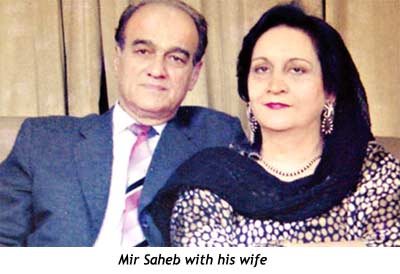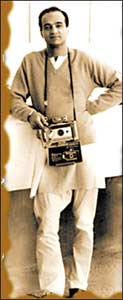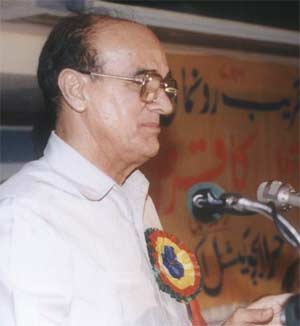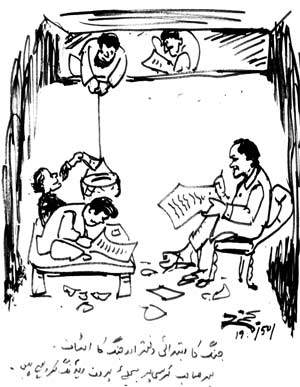A journalist par excellence
By Yusuf H Shirazi
Mir Khalil-ur-Rahman was a journalist par excellence. He founded the prestigious Jang Group of Newspapers which proved to be a beacon of light in the field of Pakistani journalism. During the pre-independence era, Mir Saheb started with a two-page Urdu paper — Jang — in Delhi. At that time, there was strict control on the media by the government. Nonetheless, Mir Saheb, who was an opponent of imperialism, wrote a piece against it. Consequently, he was arrested and jailed by the government. Mir Saheb, who was an opponent of imperialism, wrote a piece against it. Consequently, he was arrested and jailed by the government.
There was this Muslim Students Federation (MSF), led by Hamid Nizami, whose aim was to seek freedom from the British Empire. The undue arrest of Mir Saheb agitated the members of this movement, therefore, they held demonstrations throughout the country - Lahore to Calcutta to Delhi to Bombay. As a result, Mir Saheb was released, the very next morning. I happened to take part in that protest too and, thus, Mir Saheb kept paying respect to me, as long as he lived.
After the partition of the subcontinent, Mir Saheb came to Karachi and Hamid Nizami, who had led the MSF and was responsible for Mir Saheb's release, moved to Lahore. Thereafter, they continued to meet. They became very close to each other, so much so that whenever Hamid Nizami would visit Karachi he would stay with Mir Saheb and vice versa. I was a regular visitor to both the men. At that time, I was a freelance journalist and wrote for English dailies against payment. I recall that the first payment I received was for Rs 8, which was equivalent to a lot of money in those days. I expressed my desire to Mir Saheb to give me a chance to write for Urdu  newspapers, particularly Jang, but only if I was paid. “Writers in Jang write free of cost -for the sake of the newspaper’s name and reputation,” Mir Saheb had said. In fact, the very idea of journalists writing for money irked him and, therefore, he asked me that how can one, being in the field of journalism, write against payment. newspapers, particularly Jang, but only if I was paid. “Writers in Jang write free of cost -for the sake of the newspaper’s name and reputation,” Mir Saheb had said. In fact, the very idea of journalists writing for money irked him and, therefore, he asked me that how can one, being in the field of journalism, write against payment.
"I have never written without payment and I suggest that other writers should also not write without any payment. I also propose that newspapers should not publish any material which is not worth payment. This, I believe, improves the quality of writing and, in turn, improves the quality of paper and makes it worth reading," I justified my point.
After a long discussion over the matter, Mir Saheb finally agreed and I started writing for Jang against payment, which I continue to date, but now at a higher amount of Rs 10,000 per piece which Mir Shakil-ur-Rahman, the son of Mir Saheb, gladly offers for exclusiveness.
Whatever I earn through my journalistic contributions now, I donate that to the Atlas Endowment for Scholarship for deserving scholars on the moral condition that when students are in a position to pay the amount back, they will provide at least one scholarship to a needy scholar. I believe there has been no default so far. In fact, one of the recipients of the scholarship, Karim Shah and his brother, have set up two hospitals after the completion of their education - MRCP -from England. I understand they  charge no fee if a Shirazi would go there for treatment. charge no fee if a Shirazi would go there for treatment.
I continue to write against payment. Jang has always been and it still is my favourite paper: I read it; I write for it; I have an emotional attachment to it. It has the highest nationwide circulation and it is published from Lahore, Karachi, Multan, Islamabad and London as a unique paper.
The reason why Jang has come a long way is solely because of Mir Saheb's dedication towards his paper as well as journalistic traditions in Pakistan. He maintained a strict journalistic policy for the paper which he stringently followed. Sometimes, it would cross with government dictates and the establishment would take up the issue with the paper. So much so that at times the government would stop placing advertisements in Jang. But Mir Saheb would not budge from his principles. Once, a minister was soliciting Mir Saheb to be flexible in his policy towards the government. However, Mir Saheb, a man of great principles, retorted.
"I better suspend publishing the paper rather than compromising on the policy."
Gladly, the publishers today continue with the policy as it was during Mir Saheb's time which is a pleasure for me as well. Owing to the authenticity and quality of the newspapers, Jang Group continued to thrive over the years and at present it publishes various newspapers and magazines in both Urdu and English. Moreover, Jang is now publishing a world-wide magazine in collaboration with The Economist annually, and periodically with The Financial Times. It is worth reading and I have had the privilege of writing in these distinguished magazines as well.  I remember when 'The News' was first published, I had jokingly remarked: I remember when 'The News' was first published, I had jokingly remarked:
"Urdu was the domain of Jang. How come there is a paper in English too by Jang Group?"
In response to my question, Mir Saheb humorously said, "It is for you people."
Throughout my association with Mir Saheb, I had a great time with him. If I go down the memory lane, I recall that there was a time when journalists enjoyed the courtesy of 'one-and-a-half-anna (Pence)' cup of tea in the famous Pak Tea House in Lahore. When Mir Saheb would come to Lahore, he would join these joyous sessions. Similarly, in Karachi, journalists would organise a one-dish party where they would bring their own food and eat together. This "one dish party" later turned out into a "daawat" (feast) in which I had the privilege to participate, particularly when Shada Islam, a Pakistani international journalist, visited from Geneva. Mir Saheb would gladly join such sessions as well. Also, some journalists' wives would generally arrange get-togethers at homes and restaurants where my wife and I sometimes had the privilege to join them.
In these parties, Mir Saheb's Begum, "Zinda ba Salamat" (May God keep her alive and safe) would play the leading role. She is a great lady and I have the honour of knowing her. Oh, how we all miss those festive parties and get-togethers!
Coming back to his journalistic contribution, I can certainly say that Mir Saheb laid the foundation of the Jang Group so strongly that it is going forward year after year. Normally, in the third generation, businesses degrade but this is not true in the case of Jang. It continues to grow stronger under the leadership of his "sapoot" (a good son), Mir Shakil-ur-Rahman. This is a gift from Mir Saheb, not only to the Jang Group but the nation as well. Mir Saheb's son, Mir Shakil-ur- Rahman has proved to be a "sapoot" by reinforcing Mir Saheb's efforts. He is now stationed in Dubai, wherefrom he operates worldwide -  without fear or favour. without fear or favour.
(Oh God, where do such meritorious people go!)
—The writer is Chairman, Atlas Group of Companies
|
|

